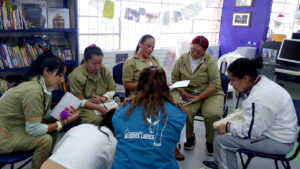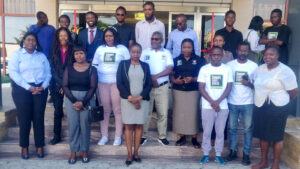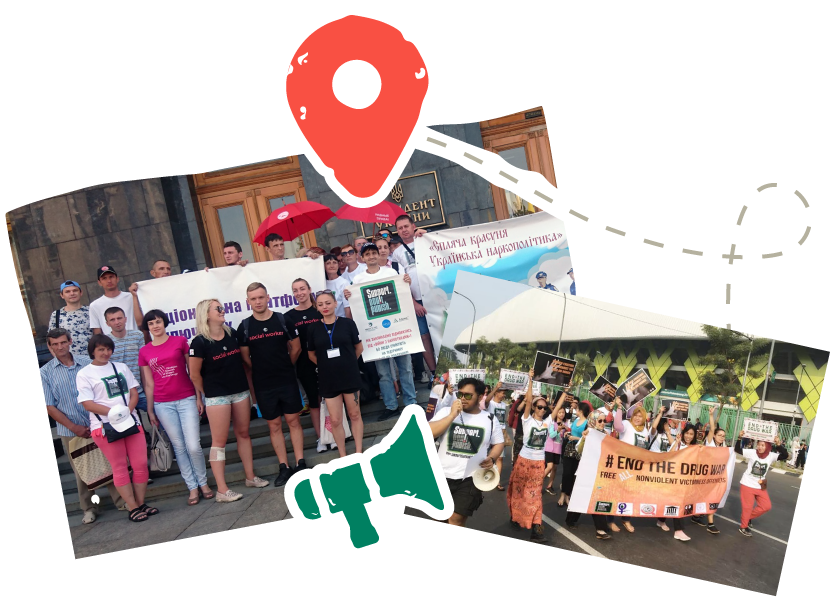The Support. Don’t Punish campaign’s Initiatives Programme awards strategic, creative and collaborative projects to carry out ambitious campaigning and advocacy work-plans.
The fourth edition of the Initiatives Programme (do check the experiences of the first, second and third cohorts!) takes place between October 2024 – March 2025 and resources activities ranging from high-level advocacy to resist the introduction of the death penalty, to artistic community projects based on co-creation, movement-building workshops bringing together groups resisting the ‘war on drugs’, and much more! These activities are organised by six community and advocacy groups in six Global South countries: Colombia, Costa Rica, India, Myanmar, Nigeria and Zambia.
Below you can spot the locations for this year’s (orange) and prior (green) initiatives:
Activities this year concern projects in Colombia, Costa Rica, India, Myanmar, Nigeria and Zambia.
Below, you can find more information about each project and expected outcomes.
The Initiatives Programme is possible thanks to the invaluable support of the Elton John AIDS Foundation, which enables our global campaign to promote harm reduction, protection from police violence and other rights abuses, and grassroots mobilisation.
Strengthening Indigenous-led harm reduction in Costa Rica
Led by the Asociación Costarricense para el Estudio e Intervención en Drogas (ACEID)
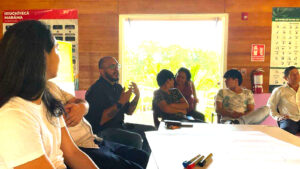
Harm reduction workshop in Maleku territory.
ACEID is collaborating with social justice promotion Ditso and the the Maleku Indigenous community towards addressing the compounded challenges that they experience —particularly young people— in relation to drugs and their embeddedness in broader systems of exclusion targeting Indigenous peoples. High levels of stigma, limited access to health and harm reduction services, systemic neglect leading to the absence of culturally-relevant harm reduction, have all been factors contributing to this community’s vulnerability to drug-related harm.
Through participatory workshops framed in an ethos of collective health and human rights, this project provides a platform for young people and women leaders from the Maleku community to devise and advocate for rights affirming drug policies that promote the health and welfare of all.
The project comprises many activities, including community mobilisation around key dates, know-your-rights training, and the launch of support networks for people who use drugs in the community. The project will culminate with the Maleku Support Don’t Punish Indigenous Festival in February 2025! Celebrate resilience and solidarity! Harm reduction is decidedly anti-racist and anti-colonial!
Advocating for life: Resisting the introduction of the death penalty for drug offences in Nigeria
Led by the African Law Foundation (AFRILAW)
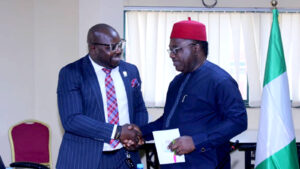
Chinwike Okereke (AFRILAW) with the Executive Secretary of Nigeria’s National Human Rights Commission (NHRC).
AFRILAW is spearheading a bold campaign to resist the introduction of the death penalty for drug offences in Nigeria. Collaborating with local and international partners, this initiative challenges punitive drug laws and highlights their disproportionate impact on marginalised communities. The project will conduct advocacy meetings with government ministries, organise a media conference, and a public road walk marking the World Day Against the Death Penalty. Through these efforts, AFRILAW seeks to elevate public discourse and push for legislative change to align Nigerian drug policy with human rights principles. The culmination of the project is a wide-ranging national stakeholders’ summit to solidify momentum toward reform.
Supporting women incarcerated for drug offences regain their freedom in Colombia
Led by the Corporación Mujeres Libres
The Public Utility Law in Colombia offers pathways toward non-custodial measures for women incarcerated for low-level drug offences. Instead of incarceration, the law offers the possibility of community service activities. The law prioritises women who were incarcerated in relation to their role as the head of household, recognising patriarchal gender roles push vulnerabilised women into informal survival economies. The implementation of this differentiated approach has been significantly delayed by a lack of awareness and systems that guide women toward their freedom.
Mujeres Libres will host workshops in prisons to inform women of their rights under this new law, advocate for public employment and reintegration policies and programmes, and launch a social media campaign against drug-related stigma. The project is led by formerly incarcerated women, fostering empowerment and paving the way for systemic change!
Leveraging intersectionality to strengthen community organising in Myanmar
Led by Drug Policy Advocacy Group (DPAG)
Amidst Myanmar’s political turmoil, DPAG is bringing together a host of communities specifically affected by the ‘war on drugs’ —people who use drugs, as well as LGBTQI+ individuals and youth— to reimagine drug policy through an intersectional lens. The project creates safe spaces for community exchanges and organising around countering gender violence, increasingly prevalent chemsex practices, and the use of drugs by gender expansive people. Through these exchanges, workshops and artistic creation, DPAG seeks to strengthen the movement to dismantle punitive norms and policies – inviting communities to reclaim their power and build solutions together.
Embedding harm reduction principles in cannabis reform in Zambia
Led by Harm Reduction Zambia Network (HRZN)
Punitive drug laws have never stopped drug markets. Small-scale farmers in Zambia rely on cannabis as a livelihood, against the backdrop of ‘war on drugs’ responses that exacerbate poverty, stigma and harm. Through this initiative, HRNZ brings together cannabis growers, people who use drugs, traditional leaders, and policymakers to advocate for change. Through workshops, community awareness campaigns and direct advocacy, this project highlights how socially just regulatory models can benefit growers, people who use drugs and society as a whole. The project also centres the decriminalisation of drug use as a baseline upon which to build sustainable alternatives to the ‘drug war’ – including through the provision of a wide range of voluntary harm reduction services. In this way, HRNZ seeks to further align Zambia¡s drug policies with human rights standards.
Treatment, not torture: advocating for rights-affirming harm reduction services for people who use drugs
Led by Indian Drug Users’ Forum (IDUF)
IDUF is tackling the rampant human rights abuses taking place in private drug treatment facilities through an ambitious advocacy programme. Through capacity-building workshops, IDUF will provide community members with resources to resist violence in treatment, identify abuses and needs, and encapsulate this experience in a short film. The project will produce a series of policy briefs on the need for equitable and inclusive treatment services. This initiative highlights the importance of community led advocacy in shaping kinder, fairer and more effective drug policies

